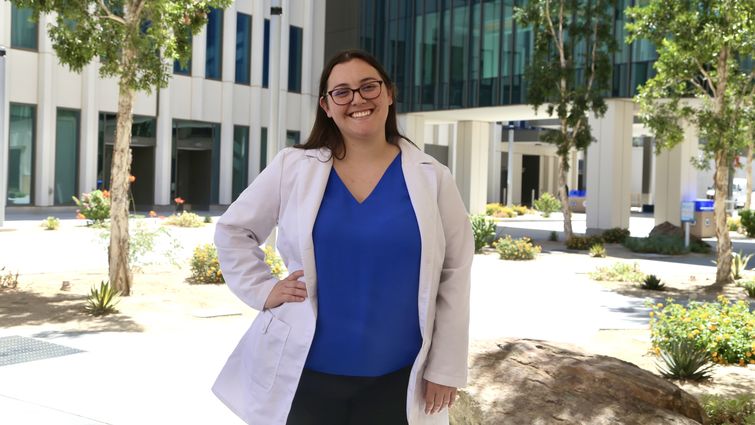

Cancer Center dietitian, Erica Paulson, MS, RDN, encourages men to drink soy milk
Myths surrounding the dangers of soy products in men have turned many away from integrating a powerful source of protein into their diets. Erica Paulson, MS, RDN, a dietitian at Loma Linda University Health Cancer Center, shares that the longstanding myths surrounding soy may be unfounded.
"I often hear patients, especially men, express concerns about consuming soy," she says. "There's a belief that soy can increase the risk of hormone-related cancers or cause undesirable effects like breast tissue development in men. However, misconceptions guide these fears."
The Truth About Soy and Isoflavones
The confusion about soy stems from its content of isoflavones — compounds that have a structure similar to estrogen. This similarity has led to the assumption that soy could mimic estrogen in the body, potentially increasing cancer risk. However, Paulson clarifies that current research has shown this is not true.
"The compounds in soy, specifically isoflavones, do not act like estrogen in the body in the way people feared," Paulson says. "In fact, these compounds have been found to have protective properties against certain cancers, including prostate cancer." She says that isoflavones can help reduce inflammation and are rich in antioxidants, crucial for preventing oxidative stress and known risk factors for cancer development.
Get our newsletter for cancer-fighting tips, activities and recipes. Subscribe
Why Soy May Be Beneficial
Paulson says soy foods, such as tofu, tempeh, and soy milk, are excellent plant-based protein sources and are lower in saturated fats than animal proteins. This makes them a healthier choice, particularly for those looking to reduce their cancer risk through diet.
"Incorporating soy and other plant-based proteins can help reduce inflammation and provide a variety of nutrients that support the body's natural defenses against various cancers, including prostate," she says.
Read: New study associates intake of dairy milk with greater risk of prostate cancer
In addition to isoflavones, soy is packed with other nutrients that contribute to its health benefits. It's a rich source of fiber, which aids in digestion and helps maintain healthy cholesterol levels. Soy also contains essential fatty acids, particularly omega-3s, which support heart health.
Paulson says it provides vital vitamins and minerals such as iron, calcium, magnesium, and B vitamins — crucial nutrients supporting overall health, bone density, and the immune system.
Navigating Misinformation
Research by The American Journal of Clinical Nutrition supports the safety and benefits of soy in cancer prevention. Their meta-analysis of 30 studies found that higher soy consumption was associated with a 26% reduction in prostate cancer risk among men.
"It's easy to come across misleading information that seems convincing but lacks scientific support," she says. "Verify claims with a healthcare professional as our understanding of nutrition and cancer prevention constantly evolves."
Loma Linda University Health experts are committed to providing compassionate, comprehensive, and personalized care throughout your prostate cancer screening journey. Make an appointment for a prostate cancer screening for you or a loved one today.




